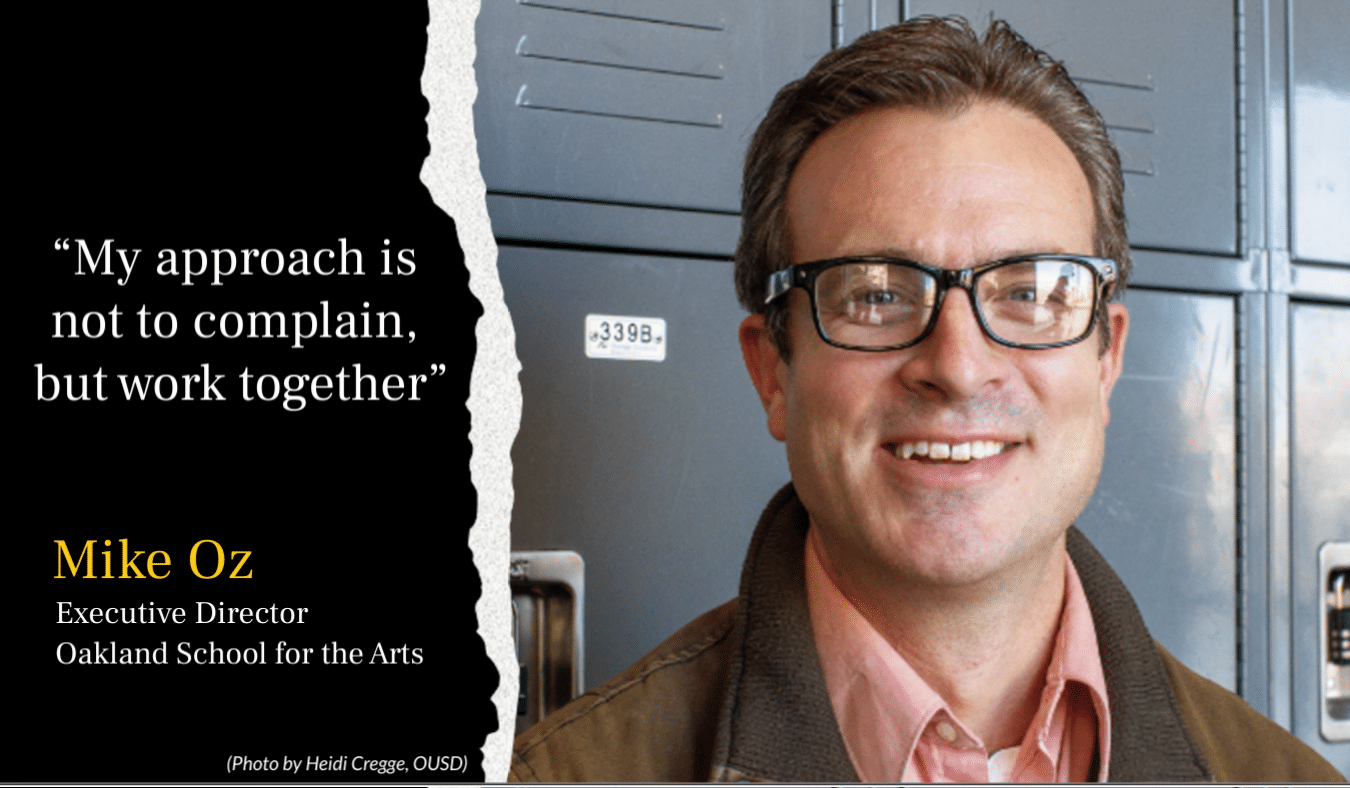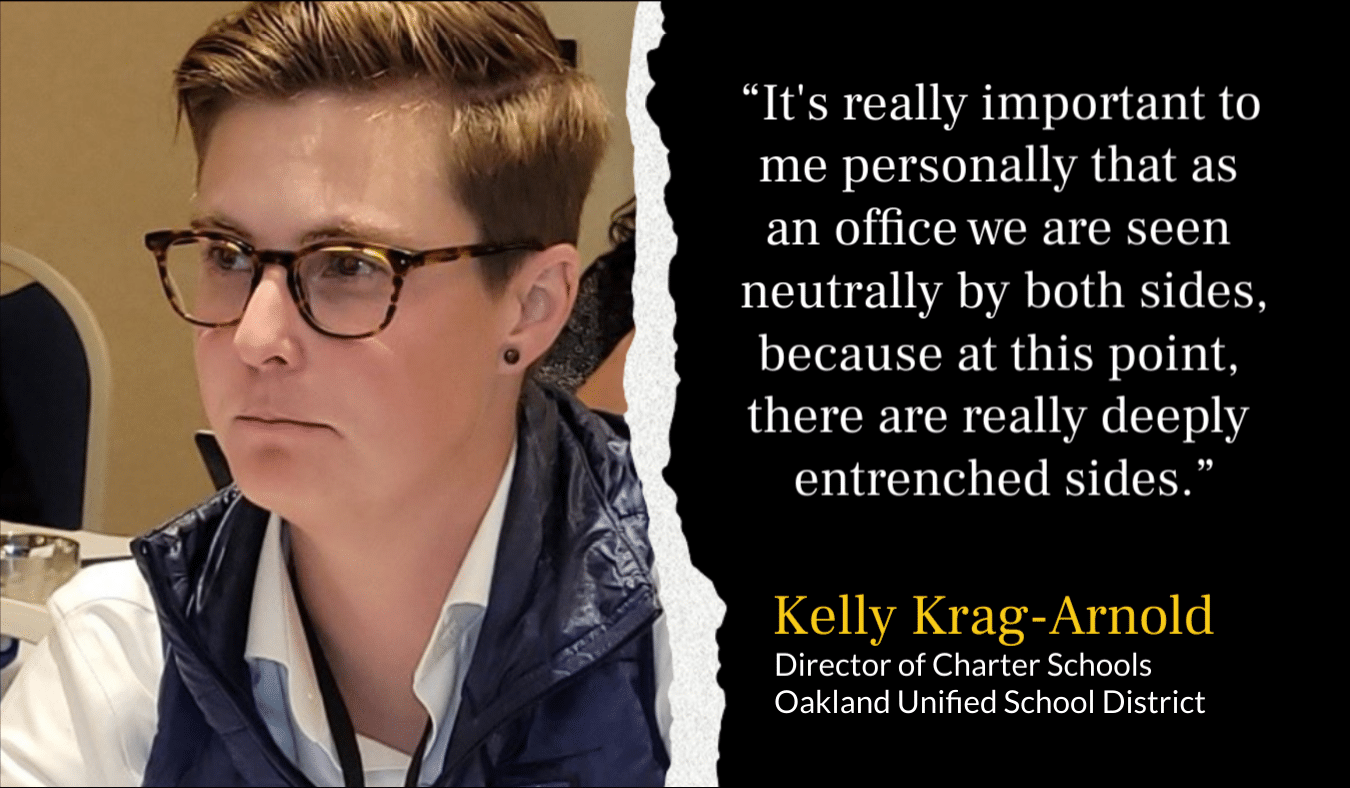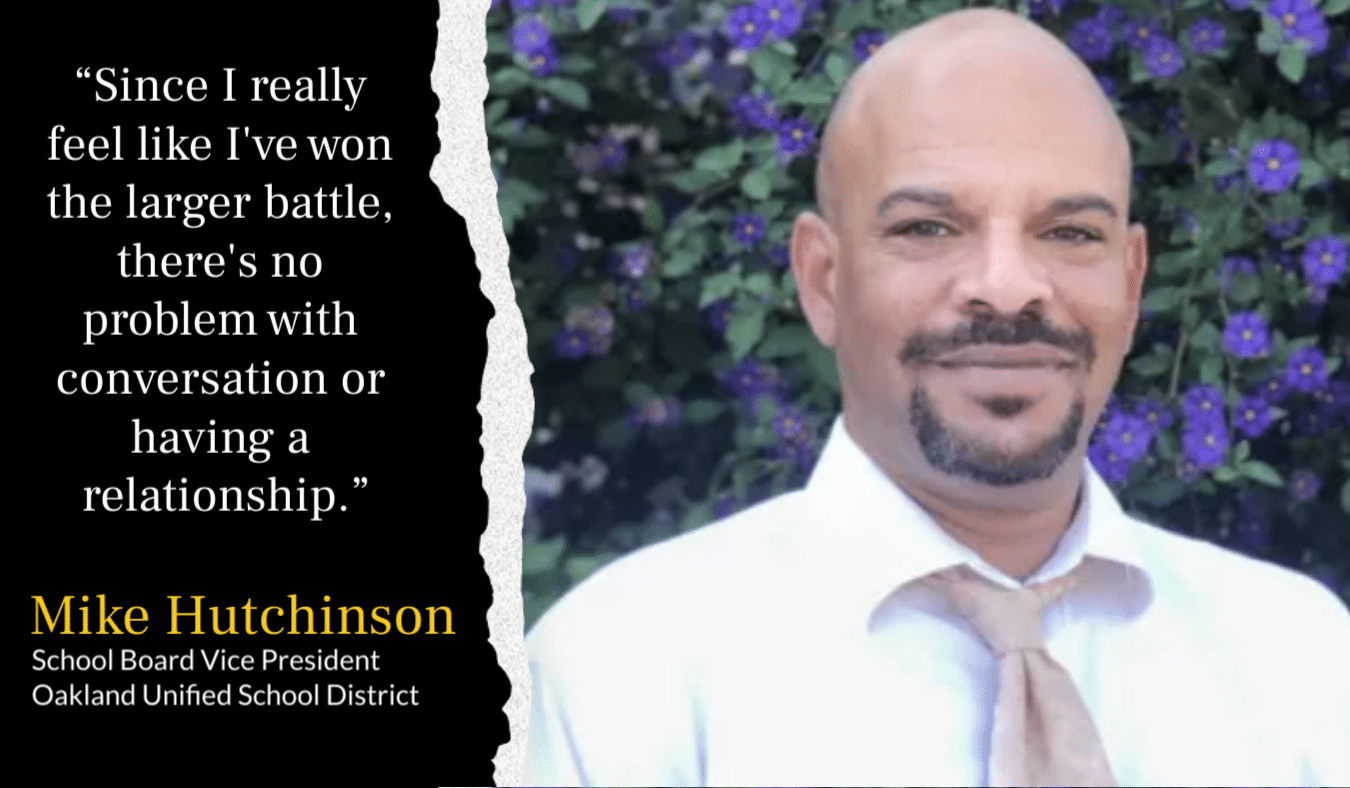Authorizer in Action
Long before he was elected to the Oakland Unified School District (OUSD) Board of Education in 2020, Board President Mike Hutchinson was staunchly and publicly opposed to charter school expansion in the district.
“My line will always be that charter schools are not public schools, so I don't want our public school resources to be used for charter schools,” explained Hutchinson. “That’s the philosophical line that I hold.”
Mike Oz, executive director of Oakland School for the Arts (OSA), joined the charter school's staff as a math and science teacher 18 years ago, three years after the school opened in 2002. For most of that time the renewal process was straightforward. OSA exemplifies a component of California’s initial Charter School Act of 1992 by providing innovative and creative programming. “[I]t was generally accepted that we’re the charter school that ‘gets a pass,’” Oz says, “because we serve a unique and specific purpose not otherwise found in the district setting. We commit 30 percent of our operating budget to arts education.”
That changed in 2019, when the renewal process for OSA became, in Oz's words “by far the most contentious." The board of education required the school to change its admissions policy from auditions out of equity concerns as gentrification changed the ethnic and racial composition of the school. Instead of pushing back, the school chose to phase out its audition process. “My approach is not to complain, but work together,” Oz explains.
Kelly Krag-Arnold may be exactly the right person at the right time to head the district’s charter school office in this environment. The six-person office overseas 28 district-authorized charter schools.
“We really do function as kind of an intermediary between the district and the charter sector,” Krag-Arnold says.
She knows firsthand the challenges of working in a highly politicized urban school district, having worked for the New York City Department of Education before arriving at OUSD’s charter office as a policy specialist four years ago.
Experience taught her that there are two absolute truths that inform her work. First, “There is never an average or normal day.” Second, “Nothing that our office does is outside of a political context.”
To address those two truths, the charter school office established two fundamental strategies.
- Maintaining neutrality: This is crucial to establishing the credibility of the charter school office. “It's really important to me personally that as an office we are seen neutrally by both 'sides,' because at this point, there are really deeply entrenched sides.” It is also the reason they are able to get things done, she says. “We want to make sure that in every single thing that we do, we're treating everyone the same
- Holding charter schools accountable: The office's work is framed around the guiding question of “how does this increase our ability to hold schools accountable to their charters?”
Paramount to that is ensuring that charter schools meet the requirements of Assembly Bill 1505, which amended the California Education Code to make it easier for authorizers to improve or close the lowest performing charter schools.
Krag-Arnold emphasizes that accountability must also include finding “the win and center that is great for kids, which is a hard line to walk.”
“I love that she said that. I agree,” responds Hutchinson, who was a strong and vocal supporter of AB 1505. “It encourages me to hear that coming from her.”
When he was elected to the board, Hutchinson says he was wary about the kind of relationship he would have with the charter office. “I thought I was going to have to crack a whip and demand more,” he recalls, “but there really haven't been any issues like that.”
Acrimony Developed Over Many Years
Hutchinson’s perspective began taking shape more than two decades ago, during a period of rapid growth in charter and small autonomous schools in OUSD that he characterizes as the “wild west.” By the 2018-19 school year, OUSD authorized 34 charter schools that together enrolled nearly 14,000 students, or about 27 percent of all Oakland public school students, according to Ed-Data.
At the same time, the district had begun closing and consolidating many district-run neighborhood schools in order to stave off fiscal insolvency. By 2003, the state legislature gave OUSD a $100 million emergency loan and placed it under control of a state-appointed administrator. Hutchinson believes these actions taken together posed an existential threat to Oakland’s public school system.
He was not alone in that view. Tensions came to a breaking point in 2019. Pandemonium broke out at a few school board meetings. At one particularly raucous session in October 2019, protesters pushed their way through barriers, forcing the board to reconvene in a secure room that was only open to the public over closed-circuit television.
After the 2020 school board election, Hutchinson and other new board members approved an Enrollment Stabilization plan. The plan prohibits district resources from being used for enrollment or marketing for charter schools and private schools, and even bars charter schools from participating in any district functions.
“When I came to the board we had a joint enrollment system; we no longer have that," Hutchinson says. "We had joint enrollment and recruitment fairs; we don't do that anymore."
Finding Common Ground Through More and More Useful Communication
The charter school office has found—and continues to identify—ways of working within political realities to improve communication and build trust with charter schools, “which is very much a long game” that requires consistency in oversight and not playing favorites, acknowledges Krag-Arnold.
The office also hosts an extensive resource section on the district’s website. The site provides a wealth of information for charter school staff, students and their families, and the community, including data, complaint processes, and step-by-step toolkits.
Krag-Arnold says she is seeing positive changes as a result. “We aren't best friends with all of our schools, but I think ultimately we have good relationships with all of our schools.”
The charter school office also has a community liaison whose goal, starting this academic year, is to attend at least one family event at each school, such as a science fair or a community open house. The intention is to build relationships with parent leaders at the schools and, in the process, to “get a feel on the ground for how things are going, what's the vibe, because you could really learn a lot from just chatting with parents.”
Some Oakland charter schools have adopted a similar approach to gaining trust with the district. Transparency is a core tenet of the Oakland School for the Arts for two key reasons, Oz explains. First is to raise OSA’s profile in the district, with the board, and in the community by being vocal about the school’s unique programming. “We’re doing amazing work and want to be seen as an asset."
Second is to notify the school board and district about any problems before they become serious. “I don't think we have anything to hide,” Oz says. OSA shares any potential concerns or challenges with the charter school office and taps into its online resources.
Even though these have always been collaborative and supportive conversations, Oz regrets that it takes a problem to bring about one-on-one assistance.
Charter leaders also communicate with each other informally, he says. If there is a pressing topic that affects everyone, many charter leaders will discuss it on an online forum. If it is something more discrete to OSA, Oz will contact another charter that has dealt with a similar situation. But he worries that they generally only connect in when there is a crisis and that “makes it feel like you’re in a permanent state of crisis.”
He would be open to regular meetings of charter school leaders convened by the charter office. “I’d like that kind of connection,” he says, “as long as it's productive time for all of us.”
Oz has noticed an increase in information and attention from the charter office that coincides with the charter school office becoming involved with California Charter Authorizing Professionals (CCAP).
“We'll get a heads up if it's something that is relevant to us,” Oz notes, and get into deep conversations during the annual visit with charter office staff. “I see that as a place probably where Kelly's bringing some of those learnings to us as we always get valuable feedback.”
Krag-Arnold has attended the past two CCAP annual conferences and brought most of her team to the last one. [See this article about the conference.]
“It's great,” says Krag-Arnold. “It's just so useful to talk to other people who have very specific questions like we do that aren't necessarily easily answered by anyone else in the district, but oftentimes the question is ‘has this ever happened to anyone across the entire state?’ And one person will say ‘yes.’”
Her staff members are also regulars on the monthly Charter Chat zoom meetings, held by the Charter Authorizer Support Initiative (CASI), which is managed collaboratively by the California Department of Education (CDE), CCAP, and the Santa Clara County Office of Education. These virtual statewide meetings provide an opportunity for authorizers to learn about and discuss legislative and programmatic information, share best practices, and ask the group for ideas for addressing different concerns and challenges.
The Next Priority
One of the many setbacks in California education due to COVID-19 was the charter school renewal schedule. Because there was no state testing during the pandemic, there was no data to use in evaluating charter schools as part of the renewal process. In July 2021, state legislators approved Assembly Bill 130, giving a two-year extension to all charters whose terms expired between January 1, 2022, and June 30, 2025. Senate Bill 114, approved this past July, extended the renewals by another year.
The first group of schools—those with charters originally expiring in June 2022—will now be up for renewal in June 2025. Nine of OUSD’s charters are in that group. The remaining 19 are up between 2026 and 2028. While it may seem a long way off, preparation for renewals is already underway. Pulling together and analyzing all the data for that process has now become the biggest priority for charter schools and the charter school office.
Given the protests in 2019 when the school board was discussing the renewal petition for Oakland School for the Arts, Oz is understandably concerned and is already getting organized, even though OSA’s current charter does not expire until June 2028.
“I think we ended up having six or seven meetings to satisfy what could have in different circumstances been one or two,” he muses. His preference is to begin discussions with the charter school office at least two years in advance to learn early on if OSA is preparing adequately, if it's on schedule, and if it's missing important information. Oz says he is hopeful that Krag-Arnold will be comfortable with this level of collaboration. “We'd like to get feedback; I think they'd be receptive to it.”
There is some indication of movement in that direction.
School Board President, Hutchinson, has not changed his mind overall about charter schools, but he appears willing to relax some constraints now that AB 1505 is law and he feels confident that there is no major threat of charter school growth in Oakland.
“Since I really feel like I've won the larger battle, there's no problem with conversation or having a relationship,” Hutchinson says. He says much of the credit goes to Krag-Arnold and the charter school office. “I really think they're moving in the right direction, and it could be a model for other charter offices or authorizers across the state, and that's coming from somebody who is not very fond of charter schools.”



